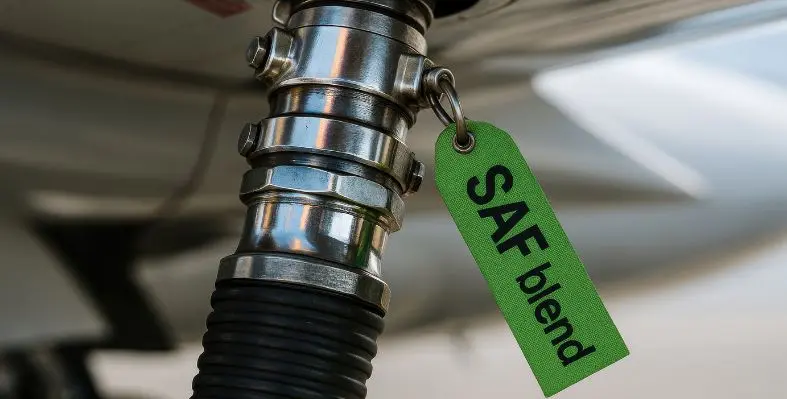The UAE is steadily advancing its sustainable aviation fuel (SAF) ambitions, with policymakers signalling that a voluntary 1% blend requirement may soon give way to a mandatory target.
The shift reflects the country’s intention to accelerate the adoption of cleaner fuels as part of its wider SAF roadmap, a cornerstone of national decarbonisation efforts for the aviation sector.
During an Airbus event at the opening of the Dubai Airshow, Sharif Al Olama, undersecretary for energy and petroleum affairs at the Ministry of Energy and Infrastructure, said that a full economic assessment now underway will shape future regulation.
This review, expected to be completed within the next year, will determine whether the UAE formalises a compulsory blending mandate. He noted the urgency of progress, emphasising that “we in the UAE have the power to drive this at a global scale.”
The coming months will see intensified coordination between major aviation stakeholders. Al Olama confirmed that he will meet representatives from Abu Dhabi Airport, Dubai Airport, Etihad Airways, and Emirates to discuss timelines for moving to what he described as the “next phase” of implementation.
Attracting capital
Feedback from these entities, he said, has so far been encouraging, with the SAF and LCAF Committee already facilitating discussions between producers and fuel offtakers.
Al Olama believes the UAE’s position as an investment hub gives it a unique advantage in scaling up SAF deployment.
The country’s ability to attract capital, provide financing, and maintain a streamlined regulatory environment has long underpinned its success in major energy transition projects.
He also pointed to global examples, such as a Hong Kong initiative that converts airport waste into SAF, as models that can be adapted for the UAE’s larger and more interconnected aviation ecosystem.
Beyond infrastructure and investment, government agility remains a central factor in the roadmap’s momentum.
The UAE has repeatedly demonstrated that policy frameworks can be developed and enacted at speed, supporting emerging technologies and sustainability-focused industries.
In this case, officials see an opportunity not just to meet international expectations but to shape them, positioning the UAE as a leader in low-carbon aviation.
Maryam Ali AlBalooshi, environment manager at the General Civil Aviation Authority, underscored the pressure to achieve meaningful progress by 2028.
She said the UAE is “trying to build our model in a different way,” adding that while policies and strategies are already in place, several supporting elements are still evolving.








